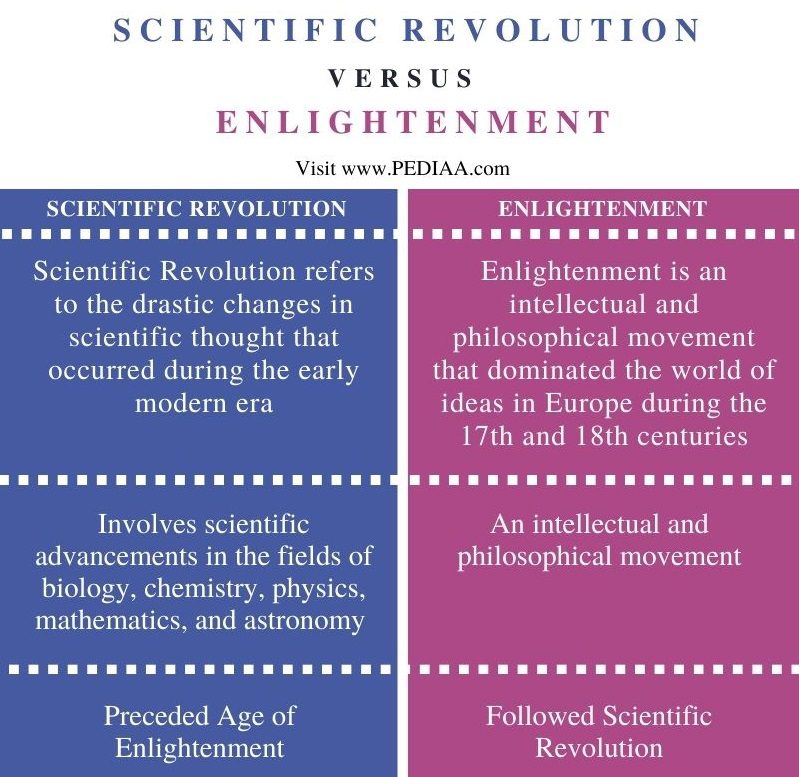The Renaissance and the Enlightenment were two significant periods of intellectual history in Western civilization. The Renaissance lasted from the 14th to the 17th centuries and was characterized by cultural and artistic changes that reintroduced ancient Greek and Roman principles. The Enlightenment, on the other hand, was an 18th-century period that emphasized reason and critical thinking over superstition and dogma. Both movements shared similarities, including a commitment to knowledge, development of new ideas and culture, emphasis on individuality, and societal progress. However, they also had differences, such as their focus on ancient vs. new knowledge, art vs. reason-based systems, and religion vs. rationalism.
The Renaissance vs. The Enlightenment: Contrasting the Major Periods of Intellectual History
Introduction
In the history of Western civilization, two periods stand out as significant periods of intellectual advancement – the Renaissance and the Enlightenment. Both movements mark a time of major philosophical and artistic creativity. However, these two periods have many differences and similarities.
The Renaissance Era
The Renaissance (14th to 17th centuries) in Europe was a period characterized by significant cultural and artistic changes that reintroduced ancient Greek and Roman principles. It was a time characterized by a shift from the medieval scholasticism of church-dominated learning to a human-focused learning approach. The Italian Renaissance witnessed notable advancements in fields such as art, science, literature, and philosophy. Renaissance thinkers considered themselves immersed in a time of rebirth and renewal.
The Key Features
The Renaissance was characterized by several key features:
- The flourishing of arts and sciences, including painting, sculpture, and architecture.
- Humanism, which emphasized the value of human beings, their achievements, and their potential.
- The emergence of new forms of government, mathematics, and science like algebra, geometry, and astronomy.
- The role of great personalities such as Michelangelo, Da Vinci, and Raphael who made significant contributions to art.
The Enlightenment Era
The Enlightenment (18th century) was characterized by a shift in philosophical focus in Europe, emphasizing reason and critical thinking over superstition and dogma. Enlightenment thinkers believed that human beings could use their intellect to better the world, and they progressed in fields like science, philosophy, and politics.
The Key Features
The Enlightenment period had several key features:
- Emphasis on the pursuit of reason and knowledge instead of religious dogma.
- The belief that people could improve their lives and societies by using reason and removing irrational beliefs.
- The application of the scientific method to examine natural and social phenomena, leading to new discoveries and advancements in fields such as physics, medicine, and chemistry.
- The belief in democracy, human rights, and equality.
Comparison and Contrast between the Renaissance and the Enlightenment
The Renaissance and Enlightenment movements have notable differences and similarities, as described below:
Similarities
- Both movements share a commitment to intellectual and cultural advancement- focusing on knowledge and the development of new ideas, culture, and values in the society.
- Both movements flourished in Europe, specifically in Italy and France.
- Both emphasized the importance of individuality and psychological depth.
- Both movements marked significant creativity in arts and literature.
- Both heralded societal progress that transcended both social and religious boundaries.
Differences
- The Renaissance emphasized the rediscovery and reapplication of classical Greek and Roman art and culture, while Enlightenment thinkers emphasized the embrace of new scientific knowledge and social ideas as opposed to clinging to ancient ideas and knowledge.
- Renaissance thinking centered on the art and science of individuals while Enlightenment’s thinking focused on reason-based systems that could be applied on people at large.
- Renaissance was focused on God and religion, while the Enlightenment was based on reason and rationalism.
- The Renaissance focused on imaginary and mythical heroes while the Enlightenment focused on real-life heroes.
- The Renaissance was a period of rediscovery of old ideas, while the Enlightenment was a period of development of new ideas.
Conclusion
The Renaissance and the Enlightenment movements stand out as two significant periods of intellectual history characterized by unique features and differences. These periods signify a shift and an advancement in society, bringing about new ideas, values, culture, and science. Renaissance thinking was very different from the radical and groundbreaking ideas of the Enlightenment in that they were more interested in restoring knowledge that existed before the medieval church’s dark period. The Enlightenment emphasized human reason, universal knowledge, and logical thinking in pursuing knowledge that could be applicable to all humankind. The two periods helped reshape and define Western civilization, and their influence can be felt still today.
